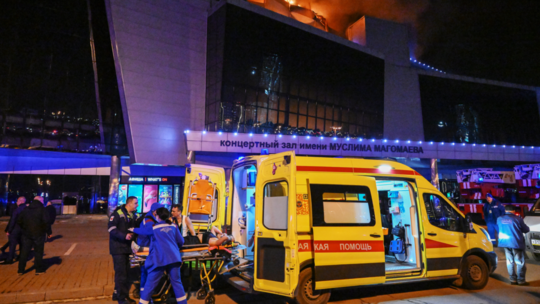Russia’s government is gearing up to blame Ukraine, guilty or not

Economist: A popular moscow concert hall turned into a hellish crime scene on the evening of March 22nd when a group of masked gunmen with automatic rifles opened fire on crowds at a rock gig. Footage from Crocus City hall showed at least four men shooting at unarmed people before entering the foyer area leading to the auditorium. State media reported that Russian special forces had begun to storm the building, just as a steady stream of dead and injured were being taken from it. Initial reports from Russian state media say at least 60 people had been killed, and more than 185 wounded.
ISIS claims responsibility for attack in busy Moscow-area concert venue that left at least 40 dead
The first reports of a developing incident came at around 8.30pm local time, when police and emergency services responded to a red alert at the venue. Over the next hour two separate explosions were heard, enveloping the complex in smoke and fire, and reportedly trapping hundreds of people inside. According to witnesses quoted by state media, the gunmen opened fire on latecomers as they queued for entry to the hall. Some survived by hiding in toilets and punching holes through to communication shafts.
“We literally jumped over corpses to escape,” a woman identified as Polina L told 112, a social-media channel closely connected to Russian law enforcement. “People ran, and they hid…We hitched a ride a couple of kilometres away, so afraid were we that they would also shoot on the street.”
The incident came two weeks after warnings from Western embassies of an impending terrorist attack in Moscow, advising citizens to avoid large gatherings. In the days that followed, Russia’s security services announced that they had foiled an attack on a synagogue. On March 9th two Kazakh citizens were reportedly killed in a shoot-out with anti-terrorism officers.
President Vladimir Putin later chose to dismiss the Western warnings during his annual address to his most senior spies on March 19th. “All this resembles outright blackmail and an intention to intimidate and destabilise our society,” he was reported as saying.
Crocus City, a glitzy retail and entertainment park in north-east Moscow, is one of the largest complexes of its sort in Europe, with its own metro station. Its concert hall regularly hosts big groups such as Piknik, the veteran rockers that were due to perform on Friday night. The venue is notable for another reason. Its owner is Aras Agalarov, a Russian-Azeri property developer with close links to Mr Putin. Some reports identified Mr Agalarov as a conduit between the Kremlin and Donald Trump during the 2016 election.
Who might have been behind the attack? There is no shortage of potential suspects. The Kremlin’s brutal two-year war in Ukraine has created new enemies and increased the amount of arms in open circulation among returnee soldiers.There is a strong nationalist and vigilante movement at home. The Kremlin’s involvement in bloody conflicts internally in Chechnya and Dagestan, and also in places like Syria, have also long made Russia a target for Islamist terrorist groups. Inter-ethnic tensions have been on the rise. Jumping to any conclusions about the perpetrators would be rash.
Ukraine immediately denied any involvement in the attack. A high-level intelligence source told The Economist that the Ukrainian government had been worried that the Kremlin might try to weaponise a terror event of this sort, especially as Mr Putin weighs up whether to risk a new wave of mobilisation. The source said it was necessary to wait to see how Russia would officially classify the event: “Whether they will say it is Chechnya, or Dagestan, perhaps that we are involved somehow, or just simply blame us directly.” The reality is that it would be an act of pure insanity for Ukraine to attempt anything of the sort. Killing civilians would be a sure way to alienate the Western supporters on whom Ukraine so heavily depends.
Dmitry Medvedev, the deputy head of Russia’s security council, has nonetheless suggested that at least some in senior Russian circles may be preparing to blame Ukraine for the incident. “If it is established that these are terrorists of the Kyiv regime…all of them must be found and mercilessly destroyed as terrorists…Death for death,” he wrote on Telegram, a social-media network. Mr Medvedev, a former prime minister and president who was once considered a Russian liberal, has more recently carved out a role as a mouthpiece for the more extreme elements of government thinking.■




COMMENTS